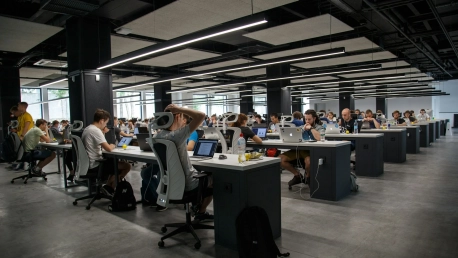The sphere of technology operates much like a pendulum, incessantly moving between consumer trends and enterprise demands. At the crux of this dynamic lies Artificial Intelligence (AI), which once merely complemented consumer electronics but has now burgeoned into a linchpin of enterprise solutions. The entwinement of AI in our personal devices has raised the bar for what’s expected in professional settings, pushing businesses to reimagine operations. This exploration traces AI’s journey, marking the convergence of personal convenience with professional efficacy, and how it’s blurring the lines between our gadgets and work tools.
The Rise of AI in Consumer Electronics
AI-Enhanced Smart Devices
In the realm of consumer electronics, AI has moved from being a buzzword to a core functionality within our homes. Smartphones that anticipate our needs, home assistants that understand our preferences, and IoT devices that seamlessly integrate to create a personalized ecosystem are no longer novelties but standards. They’re reshaping what consumers expect from technology, not just in their pockets but in their work lives as well. As voice-assisted controls and tailored recommendations become commonplace, they carry over a new level of expectation to enterprise technology, thereby influencing the next generation of business tools.
Gaming Advances & AI
The gaming industry shines as a beacon of AI’s capabilities, providing a glimpse of what’s possible when cutting-edge technology meets entertainment. From smarter non-player characters that can learn and adapt to player behaviors to environments that evolve based on in-game actions, AI is all about enriching the player’s experience. Notably, with the introduction of powerful AI chips like Lenovo’s proprietary LA AI in gaming laptops, we’re seeing a crossover of high-spec, AI-driven hardware that’s setting benchmarks for performance — standards that inevitably echo in corporate tech spaces.
AI’s Entry into the Enterprise Arena
Enhancing Professional Collaboration Tools
AI’s foray into the workplace has revolutionized the way professionals interact. Noise-cancelling features in virtual meeting platforms are increasingly sought after as they allow for clearer communication free from distracting background noises. Moreover, smart scheduling assistants utilizing AI help manage calendars more efficiently, demonstrating how smart technology is becoming indispensable for productivity. The enterprise sector is now pursuing these intelligent functionalities aggressively, not simply for the novelty but for the tangible benefits they deliver in daily business operations.
Secure and Efficient Enterprise Operations
Facial recognition for secure access, predictive analytics for preempting cyber threats, and automated systems for routine tasks — these are just glimpses of AI’s dual role in enhancing both convenience and security within the enterprise sphere. Automation of mundane activities such as predictive typing enables employees to focus on more strategic tasks, optimizing human capital. What begins as a consumer luxury, transitions into a business necessity as enterprises adopt AI to streamline operations, ensuring safety and efficiency in tandem.
Business Models Leveraging AI
Customer Experience Transformation
AI isn’t just a behind-the-scenes actor; it’s front and center in redefining customer experiences. Salesforce’s Einstein AI and Adobe’s Experience Cloud show us how businesses are curating personalized journeys for customers through predictive analytics that anticipate needs and preferences. This shift is testament to a broader strategic pivot where customer engagements are no longer uniform but individualized, thanks to the nuanced insights that AI-driven data uncovers. Businesses are actively weaving AI into their fabric to resonate with customers on a deeper, more personal level.
Future Trends in AI-Driven Enterprise Technology
The realm of technology is akin to a swinging pendulum, constantly oscillating between the momentum of consumer preferences and the pull of business needs. At the heart of this ever-moving landscape stands Artificial Intelligence (AI), which has evolved from a mere enhancer of personal tech into a cornerstone of business infrastructure. AI’s weave through our personal gadgets has upped the ante for expectations in the workplace, propelling companies to rethink the way they operate. This narrative captures AI’s evolution, highlighting the merging of personal ease with professional rigor, and illustrating how it’s increasingly merging our personal devices with the tools we use for work.In this technological era, AI isn’t just for personal gadgets; it has swiftly become a vital part of enterprise solutions. As AI’s capabilities expand, the technology that once was a novelty in consumer electronics has now become crucial for businesses aiming to streamline operations and maximize efficiency. By understanding AI’s transformation, we see a future where the convenience we enjoy in our private lives carries over into our professional tasks, paving the way for smarter work environments. With this integration, it’s becoming harder to distinguish between the tech we use for play and the tools we rely on for work.









